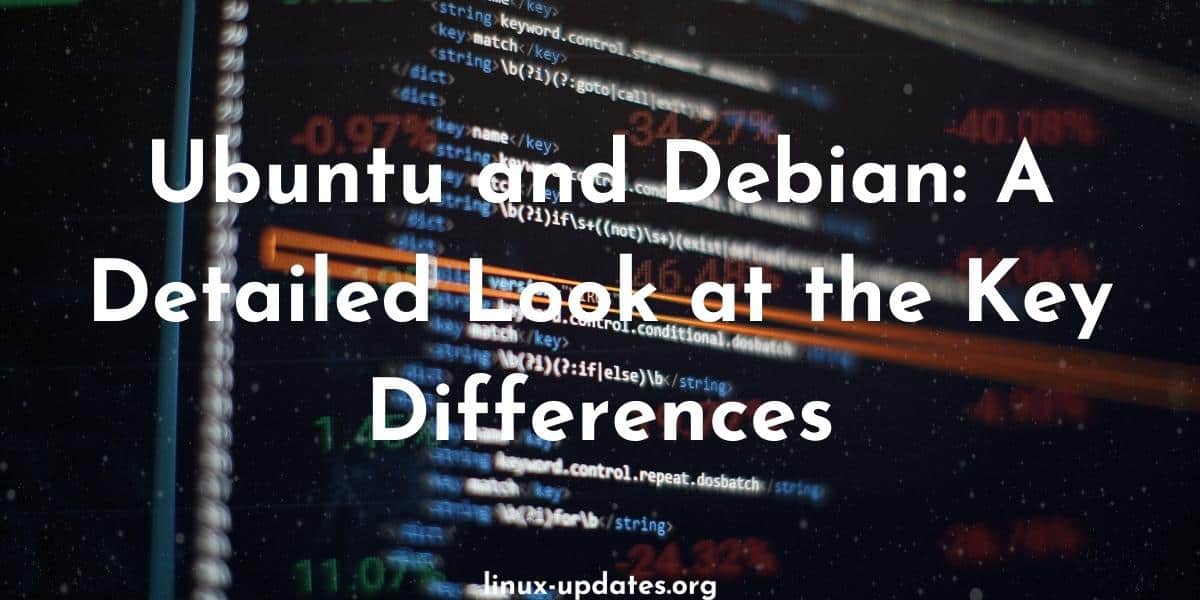Debian and Ubuntu are two of the most popular Linux distributions on the market. Both have been around for quite some time and have been used by millions of users all around the world. They are both open source, and both have a large community of developers and users who can help with any problems. But what are the differences between Debian and Ubuntu? This article will compare the two, looking at their release cycles, supported platforms, performance, installation methods, stability, and more.
What is Debian?
Debian is a free and open-source operating system that has been around since 1993. It is the largest and most popular Linux distribution and is known for its stability and security. It is also one of the oldest distributions and has gone through many changes over the years.
It is based on the Linux kernel and uses the apt-get package manager for software installation. It also comes with a wide range of software pre-installed, and updates are released regularly.
What is Ubuntu?
Ubuntu is a Debian-based Linux distribution that was first released in 2004. It is one of the most popular Linux distributions and is known for its user-friendliness and ease of use. It is based on the Linux kernel and uses the apt-get package manager for software installation.
It is designed to be easy to install, customize, and use, and comes with a wide range of software pre-installed. It is also regularly updated with new features and bug fixes.
Comparison :
Now, let’s look at how Debian and Ubuntu compare in terms of release cycles, supported platforms, performance, installation methods, and stability.
Release Cycle
Debian is known for its long and predictable release cycles. It releases a new version every two years, and each version is supported for five years after its release. This makes it a good choice for those who want stability and predictability.
Ubuntu, on the other hand, releases a new version every six months. Each version is supported for nine months, and the current version is supported until the next version is released. This makes it a good choice for those who want the latest features and bug fixes.
Supported Platforms
Debian supports a wide range of hardware platforms, including x86, ARM, and PowerPC. It also supports a wide range of popular Linux distributions, such as Ubuntu, Linux Mint, and Arch Linux.
Ubuntu supports x86 and ARM hardware platforms, as well as popular distributions such as Debian, Linux Mint, and Arch Linux. It also has a special version for Raspberry Pi devices.
Performance
Debian is known for its stability and security, and it is usually faster than Ubuntu. It is also less resource-intensive than Ubuntu, which makes it a good choice for older computers or devices with limited resources.
Ubuntu is known for its user-friendliness and ease of use, but it is not as fast or resource-efficient as Debian. It is a good choice for those who want an easy to use and feature-rich distribution.
Installation Methods
Debian can be installed using a variety of methods, including traditional CD/DVD, network install, and USB flash drive. It also supports a wide range of popular Linux distributions, such as Ubuntu, Linux Mint, and Arch Linux.
Ubuntu can be installed using a variety of methods, including traditional CD/DVD, network install, USB flash drive, and a live USB. It also supports a wide range of popular distributions, such as Debian, Linux Mint, and Arch Linux.
Stability
Debian is known for its stability and security, as it is one of the oldest Linux distributions. It is also regularly updated with bug fixes and security patches.
Ubuntu is also known for its stability, but it is not as stable as Debian. It is regularly updated with bug fixes and security patches, but it is not as reliable as Debian.
Pros and Cons
Debian is a great choice for those who want a stable and secure operating system. It is also a good choice for those who want a predictable release cycle. The downside is that it can be more difficult to install and use than Ubuntu.
Ubuntu is a great choice for those who want an easy-to-use and feature-rich operating system. It is also a good choice for those who want the latest features and bug fixes. The downside is that it is not as stable or secure as Debian.
Conclusion
Debian and Ubuntu are two of the most popular Linux distributions on the market. They both have their pros and cons, and each one is best suited for different types of users. Debian is a great choice for those who want a stable and secure operating system, while Ubuntu is a great choice for those who want an easy-to-use and feature-rich operating system.




